The “zero mileage used car” phenomenon is booming in China’s auto exports, distorting sales data and posing reputational risks to brands abroad. The model exploits legal loopholes to sell nearly new cars as used cars, bypassing licensing requirements and after-sales infrastructure for new cars, thereby reducing costs and creating room for deep discounts.
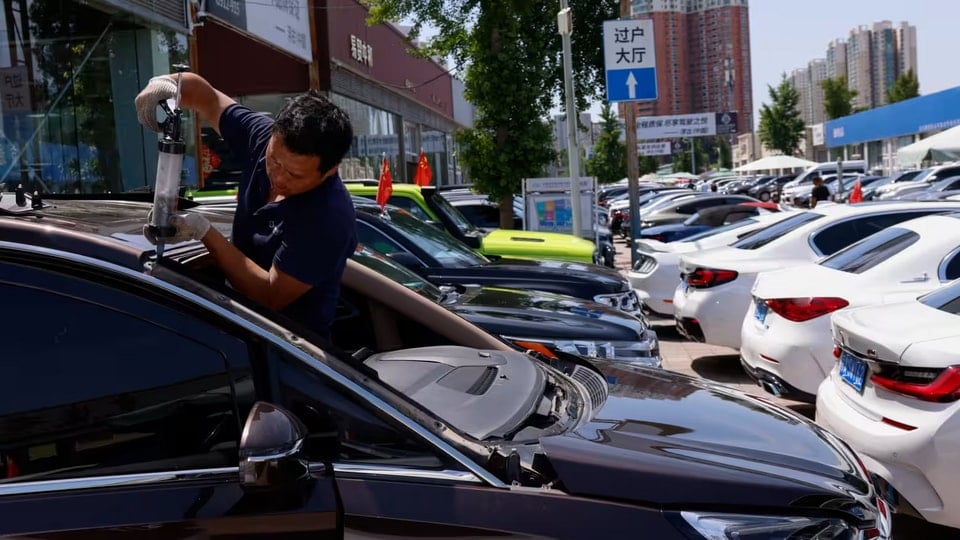
What is a “used car with no mileage” and why is it so widespread?
Since 2021, some Chinese companies have found that they can sell new cars as used to avoid the new car export process, which requires an official dealership, logistics chain and after-sales service. Exporting used cars does not require such a complicated process, allowing for significant cost reductions.
An industry estimate says about 80% of China’s used car exports are now “zero mileage used cars.” This surge is expected to push used car exports to nearly 440,000 units in 2024, with shipments expected to exceed 500,000 in 2025, up from about 15,000 in 2021, an auto dealer told Caixin.
The activity initially surged in Russia after Western companies left in 2022, then spread to Southeast Asia, the Middle East and Africa, where low-cost Chinese electric vehicles can sell for two to three times the price of domestic ones, according to Caixin sources.
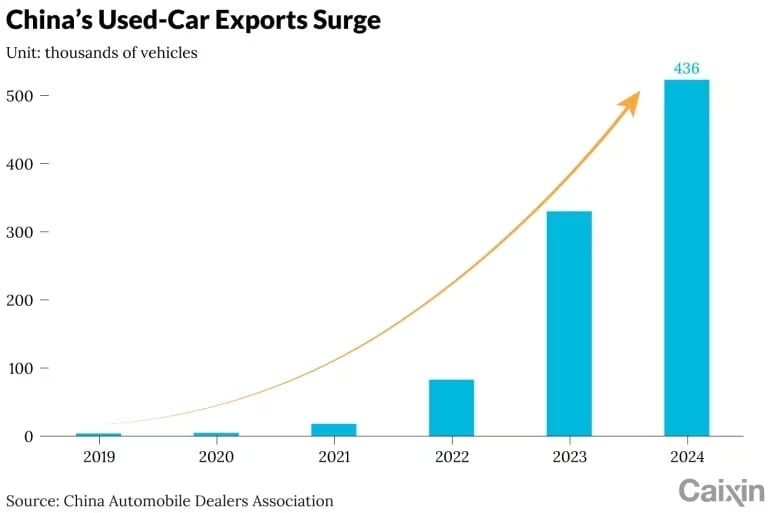
Motivation: domestic price war and incentives
The prolonged price war in the Chinese auto market has pushed down costs, while new energy vehicle (NEV) support policies such as purchase tax exemptions and car exchange subsidies (from April 2024) continue to reduce transaction costs for the “used car zero mileage” channel.
Structurally, total capacity exceeds demand, and local subsidies for electric vehicle production keep factories running. According to Li Huai of Haishangche Technology, many companies are forced to reduce direct selling prices or sell cars as used cars to turn around.
Consequences: false data, toxic competition, after-sales risks
Publicly, the practice falsifies sales data and creates unfair competition. Great Wall Motor Chairman Wei Jianjun called it “chaotic,” while Chery Automobile executives called for a ban because it is “harmful to everyone.”
For companies that have invested in official channels abroad (showrooms, after-sales service), black market cars undermine business efficiency. Due to high input prices, legal exporters find it difficult to compete with nearly new cars sold as used cars. When cars break down without after-sales service, buyers have to pay the costs themselves, making it easy to blame the brand, thereby affecting the overall reputation of Chinese cars as users have difficulty distinguishing between brands.
As supply increases, profit margins in some markets are also shrinking as multiple dealers sell the same models. The price difference between stalls is sometimes less than 500 yuan ($70).
Policy hotspots: tightening licensing and blocking “gray” channels
On September 26, China's Ministry of Commerce and relevant authorities announced that from January 1, all-electric passenger cars will be subject to the same export licensing regime as internal combustion engine vehicles, plug-in hybrids and extended-range hybrids. The aim is to curb low-cost models lacking after-sales service, reduce harmful competition and encourage the construction of overseas service networks.
Options being considered include: banning the transfer of ownership for 6 months from the date of registration to prevent immediate re-export; or imposing restrictions through administrative channels such as refusing customs clearance for vehicles registered less than half a year, vehicles enjoying tax incentives, and vehicle exchange subsidies. Li Huai said that it is possible to add conditions when issuing export certificates or verifying transfers.
In the short term, traders are in a wait-and-see mode. Some predict registrations will increase before the NEV tax incentive expires at the end of 2025, bringing another wave of “used car” exports; others see the grey market cooling as regulation becomes clearer and profit margins narrow.
Overseas risks: government and market reactions
Importers in Russia and the United Arab Emirates have complained that used cars with zero mileage are disrupting the market and evading taxes. In 2023, Volkswagen asked the UAE to block the illegal registration of its Chinese-made ID-series models, causing losses for the trader.
In the case of Neta Auto restructuring, operations stagnated in Thailand, causing dealers to pursue debt collection and customers to have no maintenance channels – showing the potential for risk when after-sales service is not guaranteed.
Solution suggestion: root cause treatment and legal channel standardization
Experts say the gap between domestic and foreign prices needs to be narrowed by gradually eliminating tax exemptions and local subsidies for EV purchases, and by developing a large-scale, legal used-car platform to increase transparency. Japan’s used-car auction model is an example of a balance between efficiency and quality control without requiring large capital risks from manufacturers.
Japan exports about 1.5 million used cars a year; the US about 800,000–900,000. Given China’s size, the potential is even greater if the legal channel is standardized.
Key metrics
| Index | Value |
|---|---|
| Proportion of "used cars with no mileage" in exported used cars | About 80% |
| Used car export in 2021 | About 15,000 vehicles |
| Used car export in 2024 | Nearly 440,000 vehicles |
| Expected shipment in 2025 | Over 500,000 vehicles |
| Price difference between sellers | Under 500 yuan ($70) |
Prospect: a phenomenon of the stage
According to Li Huai, “used cars without mileage” are a product of the current market stage; as official used car exports increase, underground trade will naturally decline. Lang Xuehong (CADA) commented that the scale of the phenomenon is still small compared to total sales. The goal is to protect the presence and reputation of the Chinese auto industry globally, while creating a healthy competitive environment.
Source: https://baonghean.vn/xe-cu-khong-so-km-bung-no-o-trung-quoc-rui-ro-siet-quan-ly-10310937.html


















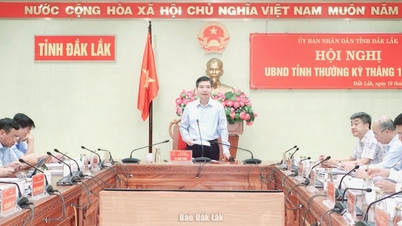






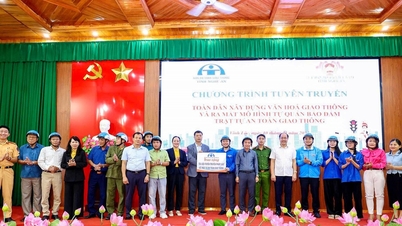












































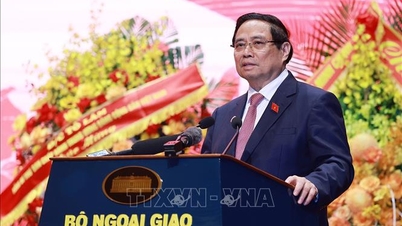




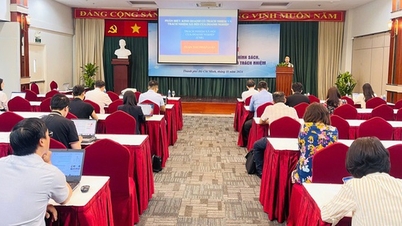








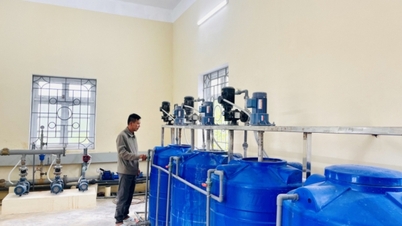



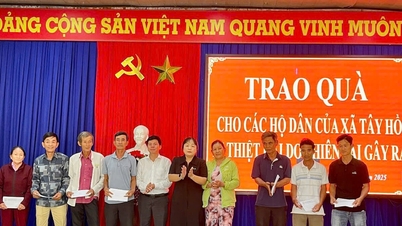




![Dong Nai OCOP transition: [Article 3] Linking tourism with OCOP product consumption](https://vphoto.vietnam.vn/thumb/402x226/vietnam/resource/IMAGE/2025/11/10/1762739199309_1324-2740-7_n-162543_981.jpeg)













Comment (0)